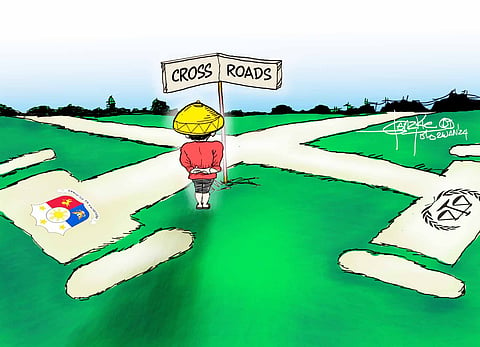
- NEWS
- the EDIT
- COMMENTARY
- BUSINESS
- LIFE
- SHOW
- ACTION
- GLOBAL GOALS
- SNAPS
- DYARYO TIRADA
- MORE

Discussions surrounding the entry of International Criminal Court investigators into the Philippines have ignited a fierce debate over national sovereignty.
President Marcos Jr.’s declaration that such entry poses a sovereignty threat and there should be no cooperation “in any shape, way or form” has raised questions about the balance between international accountability and a nation’s right to self-determination.
The ICC, established in 2002, is an international tribunal tasked with prosecuting individuals for the most heinous crimes, such as genocide, crimes against humanity, war crimes, and crimes of aggression.
The court operates on the principle of complementarity, meaning it can only intervene when national legal systems are unable or unwilling to prosecute such crimes. However, the idea of foreign investigators probing into a country’s internal affairs often sparks apprehension, particularly in nations with a history of complex political dynamics.
President Marcos Jr.’s assertion that the entry of ICC investigators threatens the sovereignty of the Philippines stems from a combination of political, historical, and cultural factors.
Firstly, there is a perception that the ICC operates with a Western-centric bias, and some leaders argue that it disproportionately targets developing nations. In this context, President Marcos Jr. may fear that the ICC’s intervention could be politically motivated, infringing on the country’s right to handle its internal affairs without external interference.
Secondly, the Philippines has a tumultuous history marked by political upheaval, dictatorship, and a struggle for autonomy. The scars of the Marcos era, during which President Marcos Jr.’s father declared martial law, still linger in the national psyche. There is a concern that the ICC’s entry might be exploited to reopen old wounds and create internal strife, jeopardizing the fragile political equilibrium that the country has painstakingly sought to establish.
Moreover, President Marcos Jr. may argue that his administration is capable of addressing internal issues and ensuring accountability without external intervention. The fear of losing control over domestic affairs to an international body might be a driving force behind the sovereignty narrative. The Philippines may view the ICC as an unnecessary intrusion that undermines its judicial system and erodes the authority of its institutions.
While the President’s concerns are valid from a nationalistic standpoint, it is crucial to consider the broader perspective of international justice and accountability. The ICC was created to address situations where national legal systems fail to prosecute crimes that shock the conscience of humanity. The principle of complementarity underscores the idea that the ICC acts as a court of last resort, intervening only when domestic systems are unable or unwilling to deliver justice.
Accountability for crimes against humanity is a global concern, transcending national borders. The ICC aims to ensure that perpetrators of heinous crimes do not enjoy impunity, regardless of their position or the geographical location of their actions. Advocates argue that the ICC is an essential mechanism to deter future atrocities, promote human rights, and foster a sense of justice at the international level.
To address Mr. Marcos’ concerns and maintain a delicate balance between accountability and sovereignty, diplomatic avenues and dialogue should be pursued. Engaging in constructive conversations with ICC officials, addressing concerns about potential biases, and ensuring transparency in the investigation process can help build trust between the international community and the Philippines.
Additionally, the country could consider strengthening its own judicial system and domestic mechanisms for addressing human rights abuses. By demonstrating a commitment to accountability at the national level, the country may alleviate concerns about the necessity for external intervention.
A collaborative effort between the ICC and the Philippines, rather than a confrontational approach, could be explored to enhance the effectiveness of the justice system.
The entry of ICC investigators into the Philippines, perceived by President Marcos Jr. as a sovereignty threat, raises complex questions about the intersection of national autonomy and international accountability.
Striking the right balance between the two is crucial for fostering a world where justice prevails without compromising the principles of sovereignty.
As the international community navigates these challenging waters, a more balanced approach that respects both national concerns and global efforts toward justice is therefore imperative.
